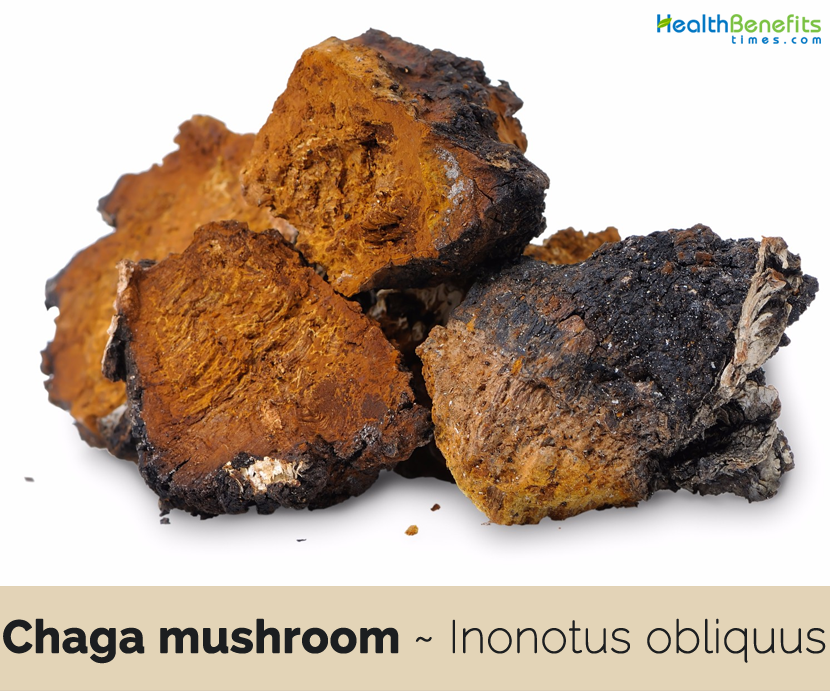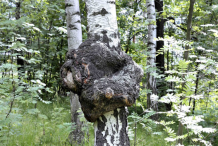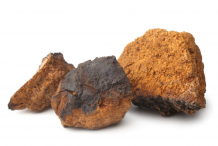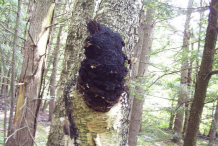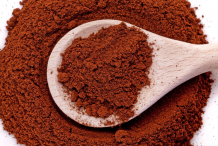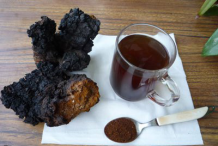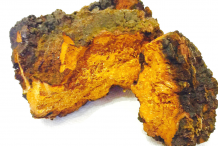The name “chaga” (pronounced “tsjaa-ga’) comes from the Russian word of the mushroom (Anglicized from czaga), which in turn is evidently derived from the word for the fungus in Komi-Permyak, the language of the indigenous peoples in the Kama River Basin, west of the Ural Mountains. It is also called “The Mushroom of Immortality” by the Siberian Russian Shamans and the “Diamond of the Forest” by the Japanese, Chaga earns its moniker, “The King of the Medicinal Mushrooms” due to it being one of the most powerful antioxidants in the world. Chaga consists of a variety of substances such as polysaccharides, betulin, betulinic acid, and inotodiol, and is said to offer a number of health benefits. It has been used by many major Northern climate dynasties for health and healing. Chaga mushroom can be eaten as a food, and is also made into tea, syrup, bath agents, and extracts. It is an important functional medicine for the apothecary to help modulate and boost the immune system. It also tastes like chocolate.
Plant description
Chaga mushroom is a tough, woody parasitic fungus that commonly grows in cold northern climates, specifically on birch trees. It grows in a “conk” form. Found mostly on white, yellow, and black birch trees they can be found on other hardwoods. Thriving on the cold winter climates of its environment it only grows in the wild, and repeated attempts to cultivate it have all ended in failure. The sterile conk is irregularly formed and has the appearance of burnt charcoal but is distinguished from other growths by its orange tissue. It is not the fruiting body of the fungus, but a mass of mycelium, mostly black due to the presence of massive amounts of melanin.
Chaga is a mushroom that contains medicinal properties that can help strengthen and heal the body naturally. Chaga takes three to five years to reach a harvestable size. Once harvested, chaga can take up to a decade to regrow to a harvestable size. Practice mindful harvesting techniques and do not remove the entire fruiting body from the tree. The mushroom has a hard texture, so it traditionally made into a powder and brewed for a long time in hot water to make a chaga beverage (often called chaga tea or coffee). It is also available as a dietary supplement and tincture (a liquid extract).
Health benefits of Chaga mushroom
There is presently a lack of clinical trials testing the effects of chaga. However, certain preliminary research recommends that chaga mushroom components may offer certain health benefits. For instance, a number of studies on cell cultures show that extracts may possess antioxidant, anti-inflammatory, and immune-stimulating properties. Let’s have a look at several findings from the available research on chaga’s health benefits
1. Suppresses Cancer Progression
Chaga mushroom is used as a folk medicine for the treatment of cancer. Due to the presence of two chemicals called betulinic acid and ergosterol peroxide, the mushroom can prevent the multiplication of human cancer cells and therefore check the progression of cancer. Thus, chaga mushrooms can be included in cancer treatments as an effective food supplement. (1), (2), (3), (4)
2. Skincare
Our skin needs protection! Chaga is wonderful for both internal and external use. In addition to containing melanin (the pigment in your skin responsible for sun-protection) Chaga is also fights infection, promotes good circulation, and reduces inflammation.
3. Protect the Immune System
Chaga mushrooms consist of good amount of antioxidant superoxide dismutase (SOD). This is considered to be among the most powerful antioxidants in the body that fights free radicals and stops inflammation. Chaga mushroom has the highest oxygen radical absorbing capacity (ORAC) or the highest antioxidant capacity among mushrooms, with an ORAC score of 146, 700 μ mol TE/100 g.1 To put this in perspective, this value is way more than that of dark chocolates or most berries, common antioxidant foods.
Thus chaga can boost your immunity and keep diseases at bay. Chaga mushrooms also consist of a sugar called beta-d-glucan, which can improve your immune responses. In fact, the traditional uses of the mushroom revolve around its antiviral and antibacterial properties that can decrease your risk of infections and communicable diseases.(5), (6), (7), (8), (9), (10), (11), (12)
4. Improve Diabetic Health
If you’re type 2 diabetes sufferers, chaga mushrooms can help reduce the sugar level in your blood. Research conducted on mice showed that chaga mushrooms can regulate the blood sugar levels in diabetic mice. Blood and urine samples of mice that were fed chaga powder for 8 weeks proved the hypoglycemic (blood sugar-reducing) nature of the mushroom. Though no research has been conducted on humans, the traditional uses of chaga mushrooms to regulate diabetes have been considered effective, suggesting that they can indeed be included in your anti-diabetes diet. (13), (14)
5. Lowers Cholesterol
Heart disease or stroke is caused due to the higher cholesterol levels in the blood. To reduce your cholesterol levels, include chaga mushrooms in your diet. Antioxidant content present in chaga prevents cholesterol buildup in your blood and restrains the cholesterol-increasing activity of high-fat diets. Chaga tea also consists of other compounds known as triterpenes. Triterpenes are special compounds which can break down LDL cholesterol in your body before it can be absorbed into the blood stream. If you want to lower or maintain your cholesterol levels, drinking a mug of chaga tea every day might do the trick.
6. Reduces Inflammation
While local inflammation helps your body heals wounds and bruises, chronic inflammation could result in diseases like arthritis, colitis, and inflammatory bowel disease. If you are affected by inflammatory diseases, chaga mushroom could be of help. The mushrooms can regulate the release of cytokines, which are proteins responsible for inflammation. Thus, chaga mushrooms can efficiently monitor the inflammatory responses of your body and treat chronic inflammatory diseases.(15),(16)
7. Protects Against Dangerous Blood Clots
Platelet aggregation occurs when blood cells clump together and form clots. Occasionally, platelet aggregation can cause blood clots in veins (thrombus), which can ultimately lead to heart attacks or strokes.
Chaga extract considerably inhibited platelet aggregation in animal studies. These results indicate a possibility for Chaga to treat or stop thrombus formation.(17)
8. Improves Digestion
If you frequently suffer from stomach upsets or bloating, your digestive enzymes could be to blame. If your body isn’t able to produce sufficient amounts of digestive enzymes, then you end up suffering from poor digestion. Chaga mushrooms encourage the secretion of digestive enzymes and ensure proper digestion. Anti-microbial and anti-inflammatory properties of mushrooms can also protect your digestive tract and facilitate the entire process of digestion.
9. Boosts Brain Function
Consumption of chaga mushroom has been associated to improved memory and better learning. Research revealed that the methanolic extract of chaga fed to mice for 7 days resulted in an enhanced cognitive function. By decreasing oxidative stress in the brain, the mushrooms can protect the brain cells from damage and boost their function.
Furthermore, chaga mushroom tea acts as a coffee-like stimulant and improves alertness. Fortunately, it doesn’t cause jitters or restlessness unlike coffee or other energy-boosting drinks. So, it helps you become more alert when you need to be, yet doesn’t hinder with your sleep or prevent you from relaxing.(18), (19)
10. May Help Relieve Inflammatory Bowel Disease
Oxidative stress from free radicals and low antioxidant levels can contribute to inflammatory bowel disease (IBD). Chaga mushroom extract’s antioxidant abilities can protect the gut from IBD. Chaga extract decreases oxidative stress in lymphocytes from both healthy individuals and IBD patients. Chaga also decreases inflammation in colon cells, which shows promise in the treatment of IBD.(20), (21)
11. Prevents Liver Disease
Chaga extracts are capable of increasing liver function and aiding detoxification. Chaga shields your liver from harmful toxins and prevents cytotoxic injury. It also protects your liver from disease by reducing oxidative damage and preventing the leakage of liver enzymes like ALT (alanine transaminase).
12. Increases Physical Endurance
If you are a fitness enthusiast or are looking for ways to exercise without immediately feeling tired, you might want to consider chaga mushroom. Research revealed that chaga mushroom can increase the duration of physical activity (swimming, in this case) in mice and reduce exercise-induced fatigue. This energy-boosting ability of chaga mushroom makes it a potential remedy for fatigue, particularly if you’re performing intense workouts or running marathons.
13. Delays Aging
Chaga mushroom consists of high levels of the antioxidant superoxide dismutase (SOD). It’s hailed for its ability to fight oxidative stress as well as aging-related changes caused by free radicals. Thus, consumption of chaga can increase longevity and delay aging. Also, chaga mushrooms are rich in vitamin C, which is known for its ability to prevent wrinkles, loose skin, and other signs of aging.
Traditional uses and benefits of Chaga mushroom
- Chaga is supposed to reduce inflammation, boost the immune system, enhance liver health, and fight viruses.
- Chaga has anti-tumor activity and can help treat and/or prevent some forms of cancer.
- Regularly drinking tea from chaga protects against stress, permanently increasing the body’s resistance to disease and bestows longevity.
- Chaga mushroom relieves pain, stops muscle spasms, stimulates removal of salts and toxins from the joints, and considerably slows aging and destruction of cartilage.
- It has been used as a folk remedy for cancer, digestive system diseases, and various ailments in Russia and other northern European countries.
Culinary Uses
- 60 years ago, Finlanders use chaga as a coffee substitute.
- As a functional food, ground or powdered chaga can be added directly to a tomato-based sauce, chili, or chocolate-and-peanut butter–based dessert or smoothie.
- Chaga is delicious when added to boiled stovetop coffee or chai, providing deep chocolate notes to the brew.
- It also makes a fine hot chocolate when mixed with cacao.
- Local beer brewers are starting to add chaga to brews of porters and stouts to add chocolate flavor.
How to Make Chaga Tea
The most popular way to consume chaga is by drinking a delicious cup of chaga tea. Below is a simple chaga tea recipe for you to try at home.
- Break the whole chaga into roughly 10g chunks.
- Grind one chunk into powder using a blender or coffee grinder.
- Place one teaspoon (two if you like a stronger tea) into a tea infuser.
- Place the tea infuser into your favorite large mug and pour in about 400 ml of hot water.
- Leave the chaga and hot water steeping for at least 5 minutes, but the longer the better to extract more of the bioactive ingredients.
- Remove the infuser from the mug and add maple syrup or honey to taste.
Precautions
- It may increase the effects of anticoagulant, antiplatelet and anti-diabetic herbs.
- Continue taking all prescribed medications, as chaga is not a substitute for traditional medicine.
- Tell a doctor about all medications being used. As with other drugs and supplements, chaga may alter the effectiveness of various medications.
- Chaga can trigger an allergic reaction in some people.
- Trouble breathing, changes in heart rate, and loss of consciousness are medical emergencies.
- Avoid using other herbal supplements while taking chaga, unless a doctor advises otherwise.
- Chaga can lower blood sugar levels. You should not take Chaga in combination with diabetes medicine because it may cause blood glucose levels to fall dangerously low.
- People with autoimmune diseases should avoid using Chaga because it can cause the immune system to become more active.
References:
https://en.wikipedia.org/wiki/Inonotus_obliquus
https://www.mskcc.org/cancer-care/integrative-medicine/herbs/chaga-mushroom
Comments
comments
| Chaga mushroom Quick Facts | |
|---|---|
| Name: | Chaga mushroom |
| Scientific Name: | Inonotus obliquus |
| Origin | Russia, Northern Europe, and the Northern US and Canada |
| Colors | Charcoal colored |
| Shapes | Looks like a Lumpy mass of burnt charcoal |
| Flesh colors | Softer rusty, yellowish-brown |
| Taste | Sweet |
| Health benefits | Delays Aging, Lowers Cholesterol, Increases Physical Endurance, Suppresses Cancer Progression, Skincare, Protect the Immune System, Improve Diabetic Health, Protects Against Dangerous Blood Clots, Boosts Brain Function, Prevents Liver Disease, May Help Relieve Inflammatory Bowel Disease, Reduces Inflammation, Improves Digestion |
